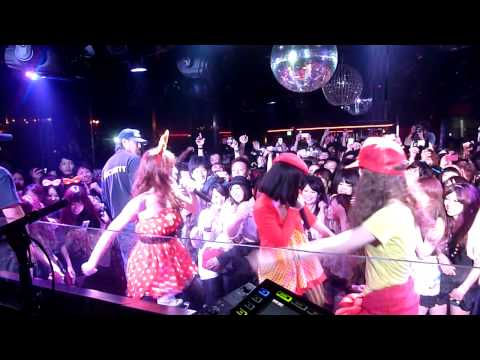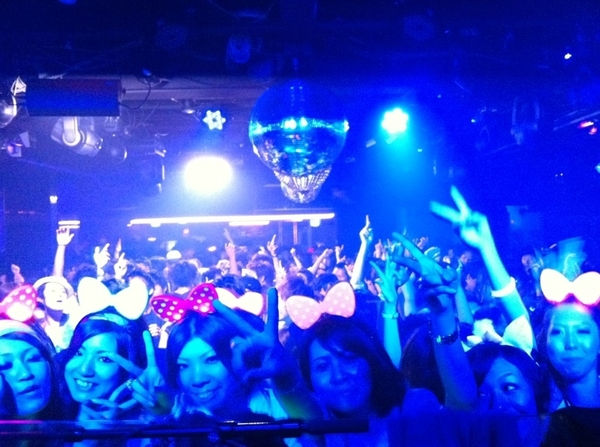Current state of the club in Japan
- memeko0079
- 2014年10月14日
- 読了時間: 4分

Do you like a dance and music ??
I like dancing without thinking about anything with cool music in the club. (●´ω`●)ゞ
Usually I go to the club once a month.
I was not prepared for the culture shock when I went to the club in Germany.
One of German club of the size such as the BIG factory !!!!!
So...what's the point different ??
I went to one of German club, not close the club
(From Friday night to Sunday)
There is the place that can dance in Japan until morning!!
BUT Japan is decided by a law until midnight 1:00.
Both men and women is the same admission in Germany.
The admission of the men and women is often different in Japan.
Admission is cheap women than men. with 1 free drink in some place.
Music to play in a club in Germany is different from Japan.
Just...depends on people...
What's kind of music do you like ??
The German club music that the sense is good above all(≧∇≦)/

I'd like to tell the current state of the club in Japan
(include the case that happened in a club 2 years ago)
If you want to get an inking of quite how strange life has become for nightclubs in Japan, chew on this.
At around 3:40am on September 2 (2012) , a group of masked men armed with steel pipes burst into the VIP room at Flower, a club in central Roppongi, and beat 31 year old restaurant owner Ryosuke Fujimoto to death.
There were around 200 other people there at that time.
but so far no arrests have been made in connection with the murder.
Yet when Flower's owner reopened a few weeks later under a new name, Studio Gate, the police were swift to act.
On October 1, Mikito Baba and seven of his employees were arrested for a crime that, in comparison to going Ichiro Suzuki on someone's skull, may seem rather quaint.
But it's one that will be too familiar to any club owner in Japan: they were letting people dance.
When you consider Tokyo's standing as one of the clubbing capitals of the world, it can come as a surprise to discover that its fabled nightspots are operating illegally.
Dancing isn't exactly forbidden here, but it's only allowed in certain places, and regulated in such a way that all-night parties can't technically happen.
NO ifs, buts:can't .....
Under the Law on control and improvement of Amusement Business
(known as fueiho in Japanese, a contraction of fueiho eigyo-to no kisei oyobi gyomu no tekiseika-to ni kansuru horitsu), any establisment that permits dancing must obtain a license.
This in turn imposes a number of requirements, the most significant of which are size - the main room must have at least 66m2 of unobstructed floor space - and opening hours: depending where it's located, a club must close by either midnight or 1 am.


Think about that for a second, then try to square it with any of the parties you've been to recently. As club scene veteran DJ Emma put it in an interview with EyesCream magazine earlier this year,"Every weekend, we DJs are breaking tha law. And for years-decades, in fact - they've been getting away with it.
To understand the present-day predicament of Japan's nightlife scene, it helps to look at the contex in which it developed.
The fueiho law regulating clubs actually includes a far wider swathe of establishments, from restaurants to mahjong parlours.
It also, albeit in a separate section, regulates the sex industry:love hotels, adult goods shop, strip clubs and "Soapland" brothels are all included.
And although it seems bizarre now to equivocate dancing with prositution, when the law was first enacted in 1948, the two weren't all that far removed.

The first police crackdown on Japanese dancers had actually occurred in 1925, as dance halls proliferated around the capital.
When a friend of the Superintendent General's complained that her son had eloped with a girl he met at one such establishment, strict ID checks were imposed at every hall and plain-clothes police officers began to patrol the dancefloors.
Unsurprisingly, this was all a little off-putting for the young women who had previously frequented such places, so a new system developed: venues started to employ so-called "taxi dancers" who whould receive tickets from male customers in return for a quick Charleston.
In post-war Japan, the sudden influx of American Gls pushed the country's dance halls even deeper into iniquity.
Occupation troops in search of a quick screw discoverd that they could find one quite easily under the cover of music, often negotiating the terms of the transaction while on the dancefloor.
But with the law on prostitution at the time only regulating organised brothels, there was nothing to prevent such licentiousness-
hence the emphasis of the new fueiho law on control and, ahem, "Improvement".
If the nightclubs were still being policed with a 64-year-old lawa now.
It might be easier to understand the recent clampdown on unlicensed dancing.
Mind you, It's perfectly normal in Japan for lawas to say a lot of things that they don't actually do, and for a long time this was true of fueiho.
After an initial burst of activity in the mid-'80s, the police's clean-up drives became more piecemeal, with the fueiho law often being used as a means to penalise clubs for other infactions such as excessive noise and drug problems.



But that all changed in 2010, most vibrant nightlife districts, America-mura in Osaka.
Things are wired for Japanese clubs at the moment .....
But they might be about to get even weirder....
The theme is what I feel is problematic in Japan..
(。◕‿◕。) Thank you for reading !!

Comentarios